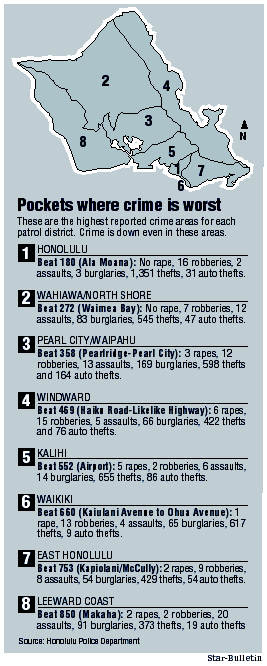

By Kathryn Bender , Star-Bulletin
Working together to fight crime on the Windward side are,
from left to right, community police Officer James Silva and
Neighborhood Security Watch members Joe Wuscher, Haiku
Village block captain; Bruce Lighter, coordinator in Kaneohe
and president of Windward NSW; Bob Briggs, NSW
coordinator in Kailua and director of the Windward
NSW; and Robert Talmadge, block captain in Haiku Village.
People patrols
keep crime
in check
Neighborhood-watch groups
By Jaymes K. Song
help make Oahu's streets
and homes safer
Star-BulletinThe economy is struggling, crystal methamphetamine use is at an all-time high and the police force has been understaffed for four years - yet crime on Oahu has dropped by almost a third.
While law enforcement agencies, the city and state all have taken some credit for the decline, the main reason to hundreds of Oahu residents seems clear: It's the people taking back their neighborhoods.
"The police cannot do everything," said Clement Jung, vice president of the Community Coalition for Neighborhood Safety. "It's concerned people making a difference."
Officials estimate thousands of residents are involved in more than 500 active neighborhood-watch groups on Oahu, and several officers attest to their effectiveness.
Community police Officer James Silva said residents are the biggest reason for the drop in crime in his Windward patrol district.
"They're our eyes and ears," Silva said.

Recently, Mayor Jeremy Harris announced that crime on Oahu over three years had declined 29.3 percent. All eight police patrol districts on Oahu reported a reduction in major crimes for 1998, resulting in an 11.2 percent overall drop in that category.University of Hawaii sociology professor David Chandler confirmed that crime is falling in Hawaii and nationwide.
Some of the drop is due to changing demographics, he said. Young males are responsible for "lots of crimes," and when there is a lower proportion of young males in the general population - as there is now - crime will decrease.
Not all are feeling the impact, though. Crime in Kaneohe hasn't dropped in the view of Barry Neulen, who has been trying to beef up his 1-year-old community watch program.
"The decline maybe is apparent on the other side of the island, but not here," said Neulen, a Kaneohe Marine Corps major and liaison between the Eden at Haiku Woods condominium complex and police. "Statistics may show it, but not everyone is experiencing a crime decrease."
Of the 22 police patrol beats in the Windward Oahu district, which stretches from Kahuku to Waimanalo, Neulen's area had the highest number of crimes. Windward Mall is included in the area and accounts for much of the crime.
"I feel there is a general threat of violation among the residents," Neulen said. "Our area has been violated."
Neulen said the Honolulu Police Department has been responsive and helpful, but more officers and resources need to be allocated by the city.
"You can do only so much with what you have," Neulen said.
According to Jung, many areas with strong citizens patrols have seen decreases in crime, while other parts of the island with newer, struggling or nonexistent neighborhood watches seem to have higher crime.
Community policing is more than just being aware of suspicious people and cars, he said. It's also getting rid of abandoned cars, cleaning graffiti on the walls, maintaining yards and getting street lights and potholes repaired immediately.
Jung calls it the "broken window theory" - if people leave one window broken, another window will soon be broken because it shows that they don't care or there's nothing they can do about it.
Much like Jung, Bruce Lighter started a watch after his Haiku Village home was ransacked seven years ago.
"What hit us the hardest was, they went through everything," said Lighter, 75. "Every drawer. All the clothes. There were no secrets anymore.
"You feel that they can come in any time," he added. "Even when you leave, you're anticipating. You worry."
With no suspects and no sense of "home," the retired construction worker went out to the community and started a neighborhood watch.
Now Lighter is the head of all 120 Windward neighborhood-watch coordinators, and can spot suspicious activity because he knows who belongs in his neighborhood and who doesn't.
And like Jung, he hasn't been hit since.
Get organized to help fight crime
How to start a community policing program in your neighborhood:
Make sure that there is interest among neighbors. Without interest or participation, a community watch will not be successful.
Gather phone numbers and names of interested neighbors on your street, block, cul-de-sac, apartment complex, housing association or area.
Decide whether your group wants a citizen's patrol (walk) or a neighborhood watch or both.
Police say to call 911 immediately if there are suspicious cars or people in the neighborhood. And they say never attempt to apprehend or confront a suspect.
Plan to meet once a week, every two weeks or every month depending on your neighborhood's needs.
Call the community policing officer in your district to schedule a presentation. The presentation will be on how to organize, meet and patrol your area.
District 1: Honolulu 529-3386
District 2: Wahiawa/North Shore 621-8442
District 3: Pearl City/Waipahu 455-9055
District 4: Windward 247-2166
District 5: Kalihi, 842-7737
District 6: Waikiki, 529-3801
District 7: East Honolulu, 529-3362
District 8: Leeward, 696-4221
Officers will walk around the neighborhood with residents and advise them on what to look for and how to better secure their homes.
Source: Honolulu Police Department